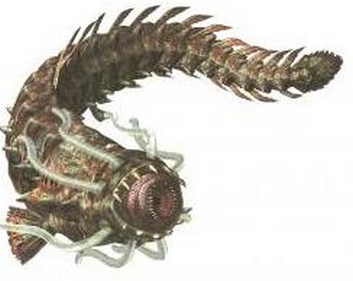Difference between revisions of "Blood Worm (giant)"
Tao alexis (talk | contribs) |
Tao alexis (talk | contribs) |
||
| Line 1: | Line 1: | ||
| − | [[File:Worm_(giant_blood)_image.jpg| | + | [[File:Worm_(giant_blood)_image.jpg|280px|left]][[File:Worm_(giant_blood)_chart.jpg|right]] |
Bloodworms are carnivorous, feeding by extending a large proboscis that bears four hollow jaws. These jaws are connected to glands that supply [[Poison (substance)|poison]] which is used to [[paralyze]] the victim so that is can be drained of blood. Unlike the leech, which attacks without the victim knowing of its existence, the strike of the bloodworm is immediately painful and shocking—but if the victim fails [[Saving Throws|save versus paralyzation]], there is little that the victim can do. | Bloodworms are carnivorous, feeding by extending a large proboscis that bears four hollow jaws. These jaws are connected to glands that supply [[Poison (substance)|poison]] which is used to [[paralyze]] the victim so that is can be drained of blood. Unlike the leech, which attacks without the victim knowing of its existence, the strike of the bloodworm is immediately painful and shocking—but if the victim fails [[Saving Throws|save versus paralyzation]], there is little that the victim can do. | ||
Revision as of 18:34, 10 February 2020
Bloodworms are carnivorous, feeding by extending a large proboscis that bears four hollow jaws. These jaws are connected to glands that supply poison which is used to paralyze the victim so that is can be drained of blood. Unlike the leech, which attacks without the victim knowing of its existence, the strike of the bloodworm is immediately painful and shocking—but if the victim fails save versus paralyzation, there is little that the victim can do.
Bloodworms will typically strike from the muddy bottom of a water source, attacking the same target, dragging stunned or killed prey to the bottom. Victims so pulled down must check their ability to breathe under water to determine if they are drowned.
Bloodworms will release their prey if they are reduced to less than 20% of their total hit points.
